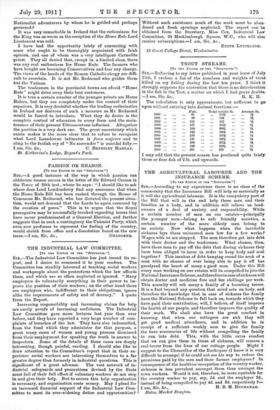THE AGRICULTURAL LABOURER AND THE INSURANCE SCHEME.
[To THE EDITOR. OF THE "SPECTATOR."1 Sin,—According to my experience there is no class of the community that the Insurance Bill will help so materially as it will the agricultural labourer. It is the compulsory part of the Bill that will in the end help these men and their families as a body, and in addition will relieve us land- owners of a deal of anxiety and responsibility. While a certain number of men on our estates—principally the younger men—belong to safe friendly societies, a certain number of the more elderly men belong to no society. Now what happens when the inevitable sickness lays these uninsured men low for a few weeks P Wages with us are stopped. The men therefore get into debt with their doctor and the tradesmen. What chance, then, have these men to pay off the debt that during sickness they have been obliged to incur in order to keep body and soul together? This incubus of debt hanging round the neck of a man with no chance of ever being able to pay it off has paralyzed the heart of many a good man. Under this Bill every man working on our estates will be compelled to join the National Insurance Scheme, and therefore in case of sickness will obtain doctor and medicine free and ten shillings per week. This security will rob many a family of a haunting terror. It is a fact beyond any question that mind acts on body, and therefore the knowledge that in case of sickness the family have the National Scheme to fall back on, towards which they have paid their contribution, will, I believe, of itself improve the health of our people, and therefore improve the quality of their work. We shall also have the great comfort in knowing that when our cottagers are sick they will get good medical attendance, and in addition be in receipt of a sufficient weekly sum to give the family the bare necessaries of life without compelling the family to run into debt. This, with the little extra comfort that we can give them in times of sickness, will remove a real terror from the lives of our cottage people. Might I suggest to the Chancellor of the Exchequer (I know it is very difficult to arrange) if he could not see his way to reduce the premiums paid by the men and their farmer employers P In
consequence of the healthier occupation of the country worker,
sickness is less prevalent amongst them than amongst the town workers. Would it not, therefore, be more equitable for
the country worker to pay, say, 3d. and the employer 2d., instead of being compelled to pay 4d. and 3d. respectively P-






































 Previous page
Previous page